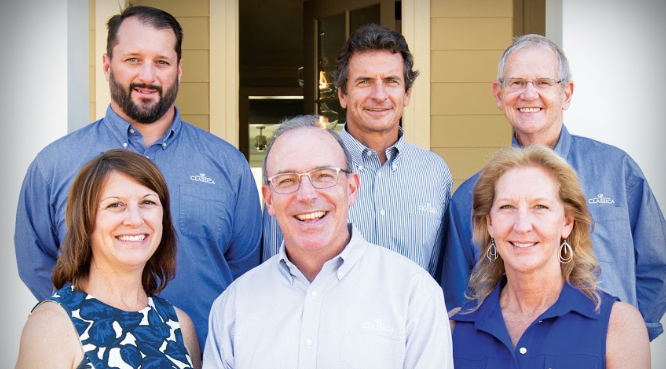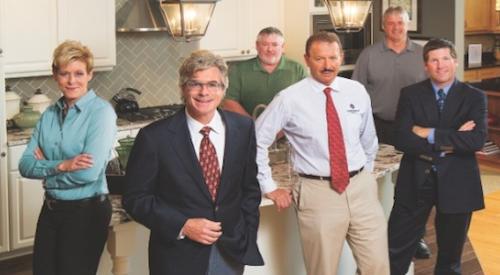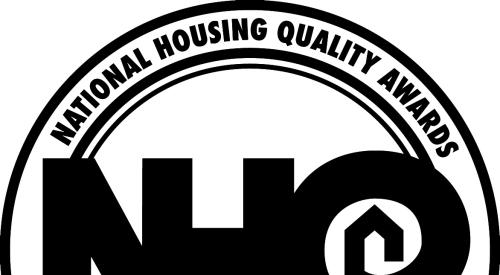There has to be a checklist, right?
As a new home progresses through the many stages of construction, isn’t there a document that the Classica Homes superintendents refer to for verifying that an area or task is job-ready or job-complete? That was one of the queries from three National Housing Quality (NHQ) Awards examiners during a site visit to the Charlotte, N.C., home builder. They were reviewing the written award application that Classica submitted weeks before.
The NHQ Awards are modeled after the Malcolm Baldrige National Quality Award and are the home building industry’s top honors for total quality management. Builders apply for the recognition by completing a questionnaire, and a panel of previous NHQ Award winners and quality-management experts review the applications and select finalists for site visits. A team of examiners visits the builder to validate whether the company actually does what it said it does on the application and to fill in missing details. They grade what they find and confer gold, silver, bronze, or honorable mention status to the finalists.
At this point in Classica’s examination, the judges specifically were looking for more detail about how the company measures actual construction quality during the build. (Classica does use an exhaustive checklist for the final quality inspection before deeming a house ready for the home orientation visit with the client.) “Most of our trades have been with us for 20 years, and some of that takes care of itself,” says Brian Hall, director of construction, who is among the six Classica managers sitting around the conference room table.
Earlier that morning, he and Bill Saint, Classica’s president and CEO, described how they vet trade partners, provide training for them, and include subcontractors in lean building exercises to help Classica identify ways to reduce costly waste and improve quality. Nearly 90 percent of Classica’s work is single-sourced with subcontractors that have been working with the company for many years. Also, during the human resources section of Classica’s presentation—the presentation was done using PowerPoint—the managers outlined how they screen job candidates using an online Berke Assessment customized for each position, hire only experienced builders, and train them step by step in a mentorship program that can last as long as six months.

David Caligaris, who has been judging NHQ applicants for 15 years and is CEO of The Green Co., in Newton Center, Mass., persists with his questions about tracking construction quality. A builder can’t remember all of the details, he says. Is there a tool you’ve considered using? he then asks.
Hall responds that as the company grows—Classica builds about 70 homes per year—it may consider using some type of tool, but for now the builder knows what the job is supposed to look like and doesn’t need a checklist.
“You’re relying on your experience to recognize what’s wrong?” Caligaris asks.
“Some stuff isn’t documented because I know my guys will get it done,” Hall responds. “Our builders just do it, and the trades know when something is wrong. We can also sit down with them and diagnose the problem.”
“So if you’re not collecting data during the construction stage, how do you drive improvement?” Caligaris asks.
Hall and Saint explain that continuous improvement happens every week when builders conduct daily construction reviews and discuss areas that need to be improved during weekly construction meetings with the builders and during sessions with the trades. Initially, the answers seem to fall short of a top score for having a systems-and-process–oriented quality management system that’s documented for all employees, current and future, to see. During a break in the examination, the judges remark that Classica seems to be relying heavily on the trades and the builders to catch flaws. Later that evening at a nearby hotel restaurant, the judges begin their grading and initially propose scoring Classica for that part of the construction quality section as a 3 on a scale of 1 to 5, meaning deployed but immature.
But during the conversation, Saun Sullivan, an examiner and the CEO of DSLD Homes, in Denham Springs, La., notes that while Classica may not have the process for improving construction quality formally spelled out, the results—high customer satisfaction and growing market share—show that a process exists. It starts with how the company hires builders, maintains long-term relationships with trade partners, and regularly communicates during construction with those in the field. The others agree. Ultimately, Classica, a 2017 NHQ Award Gold winner, was graded 4.4 for that section by the on-site and the written application examiners, with a recommendation to provide more formal documentation.
“There is not one way to solve anything,” Sullivan later says. “There are multiple ways. So I think it’s important that [applicants] realize you really don’t have to defend your way as much as tell [the judges] how you accomplished that goal. There is not one thing that gets you there; there are a lot of ways.”
NHQ: The Big App
At 250 questions, the NHQ Award application can be intimidating. The document delves into eight areas of a builder’s business: leadership, strategic planning, performance management, customer satisfaction, human resources, construction quality, trade relationships, and business results. Yet the judges try to look at each applicant within the context of what that company should be reasonably expected to accomplish. So a custom builder that closes a dozen unique houses a year is not expected to have the same systems in place as a production home builder that annually finishes 100 repeatable houses.
“A lot of builders see the application, and they say it’s too daunting, we can’t have all those [systems], so forget it. But you don’t need all these things,” Caligaris says. “I [judged] a custom builder two years ago. He did just 12 houses a year. He’s not going to have all these systems. He doesn’t need them. You can have a lot of holes in the boat and still be very good.”
For example, EYA, a Bethesda, Md.-based builder of townhomes and rowhouses and a 2015 NHQ Award Gold winner, wasn’t perfect, and the judges pointed out several opportunities for improvement, says Bob Youngentob, EYA’s co-founder, president, and CEO. “Having been a judge myself, and having [completed] the application, I think the more complete the responses can be and the better organized they can be with regard to how the questions are being asked and having all the right information in the right sections makes it easier for a judge to see if you are achieving the objectives for each of the categories,” Youngentob says. “We had a very organized application, very detailed, lots of backup information. We answered each question very specifically, so it was easy for a judge to follow.”
Classica did score some threes from the onsite examiners and even some zeros—meaning no evidence to substantiate—from the written application judges, and the on-site team noted areas where there is room for improvement. Yet they also commented that Classica’s presentation was as “tight” as it can get. Bill Saint led the application process for Simonini Builders, a Charlotte, N.C., custom home builder that won gold in 2009, and he participated in site visits as an NHQ examiner this year, so he understands what the judges are looking for.
“They’re actually answering the questions before we ask them,” pointed out Serge Ogranovitch, senior partner of The Potomack Group, in Locust Grove, Va., lead judge and the director of the NHQ Award since 2000.

Classica’s presentation was organized into a two-day agenda divided into time slots for reviewing the NHQ categories and for construction site visits. A PowerPoint presentation is not usually what NHQ examiners see from builder applicants, and other winners have adequately supported their pitch with documents in binders and handouts. But what Classica and other successful applicants did to aid their cause was to follow the flow of categories in the application.
“When you follow the flow, you end up talking about the same system when answering several different questions because the system covers multiple things,” Caligaris says. “The ability to use the application as a guide for presenting your company when the judges come out is a huge takeaway [for applicants] because everybody in that company knows their company inside and out but you can’t make assumptions about what the judges know. You have a limited amount of time to present, so use the flow of the questions in the application as your guide to present your company when the time comes for a site visit or completing your application.”
Another presentation tip is having supporting documentation easily accessible rather than repeatedly sending someone from the meeting room to fetch information. Classica laid out supplemental materials at the end of the conference room table. There, the judges could browse through the employee handbook, the client playbook (a three-ring binder that buyers receive outlining Classica’s sales, construction, and warranty processes in addition to holding important papers such as the contract, change orders, and HOA guidelines), and surveys the company sends to trade partners, prospects, and buyers asking them to rate Classica’s performance, their impression of a neighborhood, or the client’s design studio experience. Having those details at the ready gave the impression that the company was prepared and paying attention to details. “The application can be intimidating, but the process of doing it has more value than the award because it forces self-examination,” Caligaris says.
2017 National Housing Quality Award Winners:












